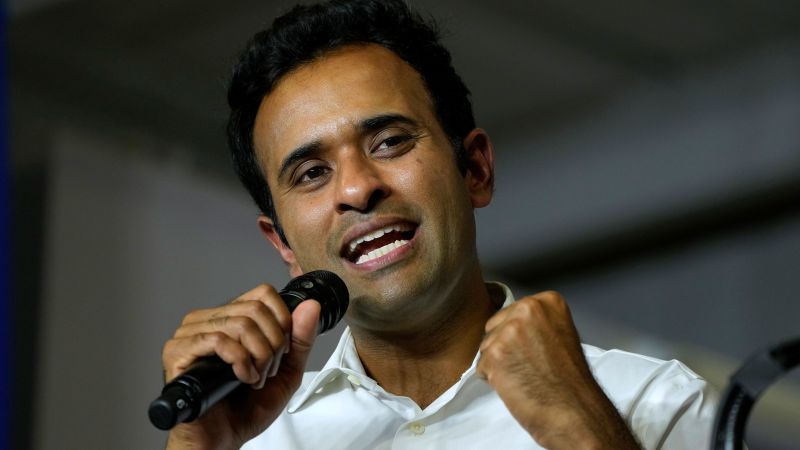Fact check: Audio debunks Vivek Ramaswamy’s false claim that he was misquoted about 9/11

Newly released audio disproves Republican presidential candidate Vivek Ramaswamy’s claim on CNN that he was misquoted by The Atlantic about the terrorist attacks of September 11, 2001.
Ramaswamy’s inaccurate insistence that he was misquoted about 9/11 in the magazine’s Monday article came during a contentious on-air exchange that night with Kaitlan Collins, anchor of CNN’s “The Source.”
Collins told Ramaswamy, “Speaking of another comment that you’ve made that is getting attention today, about 9/11 – a report in The Atlantic, that you gave an interview to. You said, quote, ‘I think it is legitimate to say how many police, how many federal agents, were on the planes that hit the Twin Towers. Maybe the answer is zero. It probably is zero for all I know, right? I have no reason to think it was anything other than zero. But if we’re doing a comprehensive assessment of what happened on 9/11, we have a 9/11 commission, absolutely [that] should be an answer the public knows the answer to.’”
Collins said, “Explain to me what you meant there.”
Ramaswamy said what he actually said was that on January 6, 2021, the day the US Capitol was attacked by a pro-Trump mob, he believes there were “many federal agents in the field and we deserve to know who they are.” He explained that he also believes that the government lied about the extent of “Saudi Arabia’s involvement” in the 9/11 attacks.
Collins then asked, “But are you telling me that your quote is wrong here?”
Ramaswamy responded, “I am telling you the quote is wrong, actually.”
Collins: “Because it says…”
As Collins re-read part of the quote The Atlantic published about 9/11, Ramaswamy repeated: “I am, actually. I actually asked…When I actually – and this is just lifting the curtain on how media works again – I asked that reporter to send the recording, ‘cause it was on the record; he refused to do it. But we had a free-flowing conversation. The truth is, there are lies the government has told about 9/11, but it’s not the ones that somebody put in my mouth.” He then made a claim about Saudi Arabian intelligence and 9/11.
Facts First: On Tuesday, The Atlantic released an audio recording of Ramaswamy’s remarks about 9/11 – and it proves that he was quoted accurately in the article. The Atlantic did not put any words in his mouth.
“Vivek Ramaswamy was not misquoted in my story,” John Hendrickson, the staff writer for The Atlantic who wrote the article, tweeted on Tuesday.
Asked for comment after the release of the audio on Tuesday, Ramaswamy spokesperson Tricia McLaughlin said in an email: “We are grateful that the Atlantic released the audio after we repeatedly asked them to do so. The audio clearly demonstrates that Vivek was taken badly out of context and even this small snippet proves that. We continue to encourage the Atlantic to release more of the recording, rather than their carefully selected snippet, so that full context and reality is exposed.”
McLaughlin did not explain how Ramaswamy was supposedly taken out of context; in fact, the audio shows that the article kept his comments in context. And asked to explain how Ramaswamy was misquoted – again, he claimed to Collins that the Atlantic had put words in his mouth and that the quote was “wrong” – she responded only, “Out of context, very clearly.”
In response to McLaughlin’s claims, The Atlantic spokesperson Anna Bross said in an email: “As is clear from the audio and transcript, the quotes in the piece are accurate.”
The recording shows Ramaswamy was wrong
The audio recording shows that the only Ramaswamy words The Atlantic did not include in the published quote about 9/11, the quote that Collins read back to Ramaswamy, was a stray five-word clause – “Like, I think we want…” – from a sentence Ramaswamy started and then abandoned.
Journalists’ practices vary about whether to include such stray remarks or to leave them out for clarity. Regardless, in this case, the clause is irrelevant to the substance of the quote.
Here is the Ramaswamy quote as CNN transcribed it from the audio The Atlantic released Tuesday. The words in bold appeared in the Monday article that Ramaswamy claimed had misquoted him.
“I think it is legitimate to say how many police, how many federal agents, were on the planes that hit the Twin Towers. Like, I think we want…Maybe the answer is zero. It probably is zero for all I know, right? I have no reason to think it was anything other than zero. But if we’re doing a comprehensive assessment of what happened on 9/11, we have a 9/11 commission, absolutely that should be an answer the public knows the answer to.”
That is simply not a misquote.
Ramaswamy also received scrutiny for his views on 9/11 earlier this month, as Collins noted in the Monday interview, after he was asked in an interview with a right-wing media outlet whether 9/11 was “an inside job or exactly how the government tells us.” He responded then, “I don’t believe the government has told us the truth. Again, I’m driven by evidence and data. What I’ve seen in the last several years is we have to be skeptical of what the government does tell us. I haven’t seen evidence to the contrary, but do I believe everything the government told us about it? Absolutely not. Do I believe the 9/11 Commission? Absolutely not.”
Ramaswamy told Collins on Monday that he “of course” does not believe 9/11 was an inside job and has “never” said it was. He said that in the previous interview he was also referring to his rejection of the government’s past statements about Saudi Arabia and 9/11.
What else Ramaswamy said to The Atlantic
The audio shows that the article accurately situated Ramaswamy’s remarks about 9/11 in context, correctly noting that, prior to those remarks, he had been speaking of his questions about “how many government agents were in the field” on January 6. The article also correctly noted that, right after the 9/11 comments, he continued, “Well, if we’re doing a January 6 commission, absolutely, those should be questions that we should get to the bottom of.”
The audio shows that Ramaswamy then continued talking about January 6 by saying, “There can’t be hush-hush, separate, it shouldn’t be outside the commission, leaked to some media personality, the hours of footage; no, this is transparent. These are the doors that were open. Here are the people that opened the doors, to whom?” The article did not use those quotes, instead picking up Ramaswamy as he continued along the same lines by saying, “‘Here are the people who were armed. Here are the people who are unarmed.’ What percentage of the people who were armed were federal law-enforcement officers? I think it was probably high, actually. Right?”


